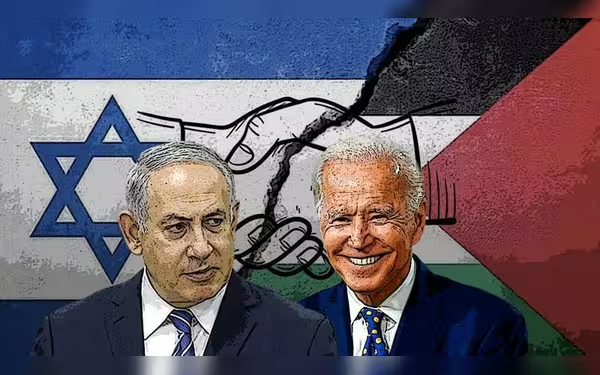Thursday, November 7, 2024 01:08 PM
Reassessing U.S. Support for Israel Amidst Ongoing Conflict
- U.S. commitment to Israel faces scrutiny amid humanitarian crisis.
- Israel's military actions escalate tensions in Gaza and Lebanon.
- Public sentiment in the Middle East shifts against U.S. policies.
 Image Credits: thefridaytimes
Image Credits: thefridaytimesThe U.S. must reassess its support for Israel amid escalating violence and humanitarian crises in Gaza and Lebanon.
The United States has long been a staunch ally of Israel, pledging to defend it against various threats. However, the implications of this commitment have rarely been scrutinized in depth. The question arises: what exactly is the United States defending? Is it merely Israel's land, its political autonomy, or perhaps its cultural identity? This inquiry has gained urgency, especially in light of Israel's recent military actions in Gaza, the West Bank, and its ongoing conflict with Hezbollah in Lebanon.
When discussing American support for Israel, it is essential to clarify the geographical boundaries of this defense. Does it encompass only the territories recognized by international law, such as those outlined in various United Nations resolutions and the Oslo Accords? Or does it extend to areas that Israel has occupied, including parts of the West Bank and East Jerusalem? Furthermore, what are the obligations of the United States in this context? Does American support also cover Israel's actions that may violate international laws?
Under the protective umbrella of the United States, Israel has often used the Palestinian Authority as a facade for its occupation of the West Bank. The situation on the ground is dire; infrastructure has been severely damaged, with roads, water lines, and sewage systems destroyed in areas like Jenin. The Israeli parliament has even passed resolutions that reject the establishment of a Palestinian state in the West Bank, further complicating the situation.
The humanitarian crisis in Gaza is particularly alarming. Reports indicate that over 42,000 Palestinians have lost their lives, with more than 100,000 injured. The remaining population of 2.1 million faces unimaginable hardships, living in conditions that can only be described as inhumane. The question looms large: will the people of Gaza ever forget or forgive the role of the United States in the devastation of their lives and homes?
Moreover, Israel's military actions have not been limited to Gaza. With the backing of what is often described as "ironclad" support from the United States, Israel has intensified its military operations in Lebanon, leading to widespread destruction. This cycle of violence is creating a new generation that may feel compelled to continue the conflict under the guise of self-defense.
Public sentiment in the Middle East is shifting. While some Arab leaders may continue to cooperate with the United States for their own interests, the general populace is increasingly frustrated with the plight of the Palestinians. This growing discontent could lead to violent repercussions against their own governments, jeopardizing U.S. interests in the region.
It is crucial for the United States to reassess its unwavering support for Israel. This support should not come at the expense of alienating the majority of Arab and Muslim nations. A balanced approach that promotes justice and human rights is essential for fostering peace in the region. The U.S. must strive for a peaceful coexistence between Israelis and Palestinians, as this is not only vital for regional stability but also for America's own international standing.
The United States' commitment to Israel should be re-evaluated in light of its broader obligations to promote peace and justice. The world is facing numerous challenges, including climate change and social inequality, and the U.S. needs to maintain credibility in its policies to ensure global cooperation. By actively pursuing the rights and freedoms of Palestinians, the United States can help create a more stable and peaceful future for all parties involved.













